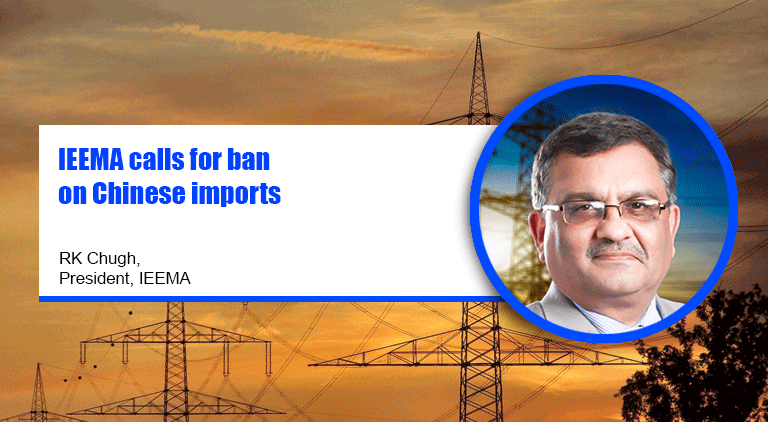IEEMA calls for ban on Chinese imports
By EPR Magazine Editorial June 29, 2020 11:56 am IST
By EPR Magazine Editorial June 29, 2020 11:56 am IST

IEEMA submitted a representation to the Department of Industrial Policy and Promotion (DIPP) regarding incidence of imports from China and interventions required from the government.
RK Chugh, President, IEEMA
Imports of electrical equipment in India have captured 31.55 percent of the market and it poses a threat to the domestic industry. Indian Electronic Equipment Manufacturer’s Association (IEEMA), the apex body for the power equipment industry, is calling for reducing dependence on China for critical equipment. An exclusive interview of IEEMA President RK Chugh with Subhajit Roy, Executive Editor.
Mr Chugh, you have been vocal on the illegal and cheap imports issue. What’s your comment on the imports of electrical and electronics equipment from China?
The dependence on China for equipment belonging to this critical sector may lead to a “dangerous” situation for India as their servicing and spare parts are unlikely to be available in case there is a conflict of an economic standoff with China. The cheaper Chinese imports in the heavy industries segment, including electrical equipment, have led to under-utilisation of the domestic capacity in the capital goods sector. Electrical equipment imports from China continued to increase in the last two decades because of which country has incurred a loss of several crores of rupees. For generation in particular, Chinese power equipment is not fully suitable for coal-based thermal plants in the country as these equipment are suitable for Chinese coal having high sulphur and low calorie.
How is the industry body IEEMA reacting to it?
The government should consider banning imports of equipment related to power generation and transmission & distribution segments from China. We have already provided them with a detailed list of items where local capacity and capability exists in India and there should be no reasons for these items to be imported from China. It is detrimental to the interests of the country.
Have you shared any recommendation/s to the government in this regard?
IEEMA submitted a representation to the Department of Industrial Policy and Promotion (DIPP) regarding incidence of imports from China and interventions required from the government. Based on the earlier projections given by the government for capacity enhancement in power generation, transmission and distribution, the domestic electrical equipment manufacturing industry had made huge investments in doubling and, in some cases, even tripling its production capacity. However, this built-up capacity stands under-utilised across several products due to sluggish domestic demand on account of the slowdown in the power sector and a surge in imports of electrical equipment in recent years. This is significantly impacting the commercial viability of the domestic electrical equipment industry and impacting both the top-line and bottom-lines of the manufacturers.
Imports of electrical equipment in the country have assumed very threatening proportions and have now captured 31.55 percent of the market for electrical equipment in India. Domestic electrical equipment manufacturing industry suffers a significant disadvantage vis-à-vis imports due to higher taxation; higher financing cost; lack of quality infrastructure; dependence on foreign sources for critical raw material and components, etc.
Disproportionate reliance on imported power equipment, with uncertain quality and lifecycle, and with no domestic manufacturing facility to provide emergency repairs, spares, replacements, etc. especially for heavy equipment, is fraught with long-term risks. With integration of automation and communication technology into the T&D network, there is also a possibility of a major security concern.Won’t the decision of increasing basic customs duty on solar equipment further impact the country’s renewable energy target?
Recently there have also been several campaigns in India calling for a reduction in Chinese imports due to public outrage on the Indo-China border tensions. For the past three financial years, FY17, FY18, and FY19, the total value (China and beyond) of the country’s solar imports was US $3,196 million, $3,837 million, and $2,159 million, respectively. Within this, Chinese firms supplied about 80 percent of the solar cells and modules used in India.
In order to contain this, almost two years back, India imposed a 25 percent safeguard duty on solar imports from China and Malaysia. But the results have been a mixed-bag. Some developers were reported to have started circumventing the duty by routing solar cells through Thailand and Vietnam. Not only that, but a report by the Directorate General of Antidumping and Allied Duties, India observed that, “unscrupulous elements are able to import the Chinese goods by circumventing the goods put under anti-dumping framework through misclassification of products.”
The search for loopholes will continue until there is a domestic competitive alternative to cheap imports from China. Besides energy security, indigenous manufacturing base in India would also help enforce performance contracts, build the foundations of a domestic recycling industry, and not to forget, create jobs. Good news is that local manufacturing capacity in solar cells and modules is picking up fast and renewable sector should soon be able to live without imports.
We use cookies to personalize your experience. By continuing to visit this website you agree to our Terms & Conditions, Privacy Policy and Cookie Policy.